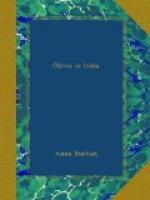A very pleasant thing about our present solitude is that one can read aloud or speak to oneself without risk of being thought demented. The fact is, the inhabitants of the little village on the outskirts of which we are camping regard us as so hopelessly and utterly mad already that no further display of eccentricity on our part could make any difference.
Even in the jungle there are servant troubles. Our cook, finding, I expect, this life too uneventful, intimated that his father was dying, and left last night. We thought we should have to go without dinner, but Autolycus, stepping gallantly into the breach said No, he would cook it; he had often cooked while with Colonel-M’Greegor-Sahib. The next we saw was a hen flying wildly, pursued by Autolycus, and in about half an hour it appeared on the table, its legs—still rather feathery—sticking protestingly from the dish. That was all there was for dinner except two breakfast-cups of muddy coffee.
... The dak came in a little while ago with the. English mail. I have just finished reading your letter. I think I know what you must feel about your book. It is sad to come to the end of a long and pleasant task—something finished you won’t do again; a page of life closed. I know. It scares me, too, how quickly things come to an end. We are hurrying on so, the years pass so quickly, that even a long life is a terribly short darg. Life is such a happy thing, one would like it to last. I was twenty-six yesterday, and if my soul were to say to me now, “Finish, good lady, the bright day is over,” I would be most dreadfully sorry (and I would expect everyone else to be dreadfully sorry too; I’m afraid I would insist on a great moaning at the bar when I put out to sea); but I would have to admit that I have had a good time—a good, good time.
But I don’t agree with you about the darkness of what comes after. How can it be dark when the Sun of Righteousness has arisen? I suppose it must be very difficult for clever people to believe, the wise and prudent who demand a reason for everything; but Christ said that in this the foolish things of the world would confound the wise. I am glad He said that. I am glad that sometimes the battle is to the weak. At the crossing, “I sink,” cried Christian, the strong man, “I sink in deep waters,” but Much-Afraid went through the river singing, though none could understand what she said. I don’t know that I could give you a reason for the hope that is in me (I speak as one of the “foolish things"), but this I know, that if we hold fast to the substance of things hoped for, the evidence of things not seen, looking to Jesus, the author and finisher of our faith, then, when the end comes, we shall be able to lay our heads down like children saying, This night when I lie down to sleep, in the sure and certain hope that when, having done with houses made with hands, we wake up in the House of Many Mansions, it will be what John Bunyan calls a “sunshine morning.”




